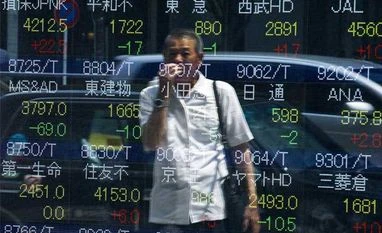Asian tech stocks rose on Thursday, following their U.S.-listed peers, though broader gains were capped by the strength of the U.S. dollar as investors bet on interest rates rising more quickly in the United States than other major economies.
European stocks were expected to advance with Euro Stoxx 50 futures up 0.5% and FTSE futures 0.24% higher in early trade, potentially indicating a rebound after a week when rising COVID cases in Europe have weighed on market sentiment there.
Japan's Nikkei rose 0.8%, helped by gains in tech stocks such as Sony, which rose 1.5%, while Hong Kong's bruised tech index snapped six sessions of losses to gain 0.85%, versus a 0.25% gain in the local benchmark.
Heavyweight Alibaba, up 2.7%, was among the leaders.
Analysts said the gains largely followed overnight advances by U.S. tech stocks as investors decided a sell-off caused by prospects of higher U.S. interest rates had gone too far. [.N]
Other share moves were more muted however. MSCI's broadest index of Asia-Pacific shares outside Japan traded either side of flat, and was last 0.06% higher.
More From This Section
In broad terms, "when it comes to regional equities allocation, we're watching the U.S. dollar which is making new highs and that is a headwind for emerging market equities," said Fook-Hien Yap, senior investment strategist at Standard Chartered Bank wealth management.
The dollar is trading near its highest in almost five years versus the Japanese currency at 115.3 yen, and testing a near 18-month high against the euro which was at $1.1211. [FRX]
Supporting the greenback, several U.S. Federal Reserve policymakers said they would be open to speeding up the tapering of the central bank's bond-buying programme if the high rate of inflation held, and move more quickly to raise interest rates, minutes of the Fed's Nov. 2-3 policy meeting showed.
"The market is now pricing in more than two hikes next year, but we think that is overly aggressive. We are only looking for about one hike next year," said Yap.
These expectations have pushed U.S. treasury yields higher, albeit inconsistently, with benchmark 10-year notes last yielding 1.6427% having risen as high as 1.6930% on Wednesday.
U.S. Treasuries will not trade on Thursday because of the Thanksgiving holiday. U.S. stock markets will also be closed and will have a shortened session on Friday.
In other central bank news, the Bank of Korea raised its policy interest rate by 25 basis points on Thursday, as widely expected, as concern about rising household debt and inflation offset uncertainty around a resurgence in COVID-19 cases.
Oil prices rose slightly after a turbulent few days in which the United States said it would release millions of barrels of oil from strategic reserves in coordination with China, India, South Korea, Japan and Britain to try to cool oil prices after calls to OPEC+ to pump more went unheeded. However, investors questioned the programme's effectiveness, leading to price gains.
Brent crude was last at $82.53 a barrel, up 0.33%, while U.S. crude was at $7856, up 0.2%. [O/R]
Spot gold edged 0.17% higher to 1791 an ounce.
(Reporting by Alun John; Editing by Christopher Cushing and Stephen Coates)
)